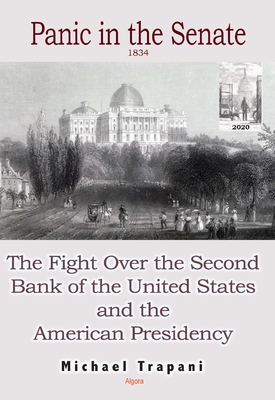
Sound Bite
President Andrew Jackson fought many battles, but equally important, he campaigned for a smaller government and fought financial bureaucracy.
In a story that resonates with Americans who follow the news today, this book analyzes the heated debates in Washington and throughout the country over how much power the President ought to have and how much the central bank (now called "the Fed") could exercise in controlling the nation's economy.
This book argues that the Senate session of the 23rd Congress (often referred to as the âPanic Sessionâ) served as the final arena for both battles: what form the American presidency would take and the economic direction the country would follow.Â
About the Author
Michael Trapani has taught US History for fifteen years. His article "A Deal Gone Sour: How a Henry Clay/Nativist Alliance Nearly Stopped the Civil War" was published in the New York History Review in 2018. He holds a Masters' degree in American History from Arizona State University.
|
|
About the Book
Just as many people today question the role of the Fed, Andrew Jackson opposed the central bank of the United States, vehemently arguing that the Bank gave privilege and unfair advantage to the elite few at the expense of the public. ...
Just as many people today question the role of the Fed, Andrew Jackson opposed the central bank of the United States, vehemently arguing that the Bank gave privilege and unfair advantage to the elite few at the expense of the public.
This became the most crucial political battle waged during the antebellum period, outside of the slavery issue. This book fills an important void, offering a deep analysis of the arguments put forth by Jacksonâs Senate allies and their opponents. These debates are crucial to understanding the formation of the second party system, the evolution of the presidency under Jackson, and the economic direction the country took as it spiraled uncontrollably towards the Civil War. The debates of the session are often condensed down to the words of Senate giants such as Henry Clay, John C. Calhoun, and Daniel Webster, but this book argues that othersâ contributions to the session were equally important.
The Bank War altered the economic course the country had followed since its birth, but further, the manner in which Jackson waged the war forever changed the nature and power of the American president, as well as its relationship to the people.
When Jackson ordered the removal of the government deposits from the Bankâs vaults, effectively killing it, the newly seated Senate of the 23rd Congress launched into the longest continuous debate taken up by that body to that point in its existence. This book dives into the Senate Register of Debates to examine these crucial disputations that took place between December 1833 and March 1834.
Ostensibly the argument was about the removal of the deposits, Jacksonâs biggest detractor in the Senate, Henry Clay, successfully restructured the debate to focus not just on banking, but on presidential power and the presidentâs relationship to Congress.
In the end, the president would be censured and by the debateâs end the anti-Jackson Whig Party had formed, but that could not stop Old Hickory from establishing a new office of the president, unrecognizable from the one created by the nationâs founders.
|
On a particularly tense March day in the United States Senate, Henry Clay, who commanded the floor speaking on behalf of Philadelphia mechanics crushed by Andrew Jacksonâs war with the Second Bank of the United States, turned his attention to Vice President Martin Van Buren, who was presiding over the session. The Kentuckian, with the eyes and...
On a particularly tense March day in the United States Senate, Henry Clay, who commanded the floor speaking on behalf of Philadelphia mechanics crushed by Andrew Jacksonâs war with the Second Bank of the United States, turned his attention to Vice President Martin Van Buren, who was presiding over the session. The Kentuckian, with the eyes and ears of a packed gallery fixed upon him, implored the vice president to:
Go to him and tell [Jackson], without exaggeration, but in the language of truth and sincerity, the actual condition of his bleeding country. Tell him it is nearly ruined and undone by the measures which he has been induced to put in operationâ¦Depict to him, if you can find language to portray, the heart-rending wretchedness of thousands of the working classes cast out of employment. Tell him of the tears of helpless widows, no longer able to earn their bread, and of unclad and unfed orphans who been driven, by his policy, out of the busy pursuits in which but yesterday they were gaining an honest livelihoodâ¦Entreat him to pause, and to reflect that there is a point beyond which human endurance cannot go, and let him not drive this brave generous, and patriotic people to madness and despair.
Clayâs impassioned plea to the vice president brought women in the gallery to tears. At that point, Van Buren ordered another senator to take his chair so he could descend to the floor and perhaps confront Clay on his direct challenge. The gallery held its collective breath at the possibility of a brawl on the Senate floor as Van Buren approached his challenger. Instead, the vice president calmly asked the Kentuckian âfor another pinch of [his] aromatic Maccoboy.â Clay obliged, Van Buren took a pinch from Clayâs gold-plated snuff box, and the tension was thus eased.
Such was the story of one of the more dramatic moments of what became known as the Panic Session of 1833-1834. The . . .
|
|
Pages 218
Year: 2021
BISAC: HIS036040 HISTORY / United States / 19th Century
BISAC: POL040010Â POLITICAL SCIENCEÂ / American Government / Executive Branch
Soft Cover
ISBN: 978-1-62894-455-6
Price: USD 21.95
Hard Cover
ISBN: 978-1-62894-456-3
Price: USD 29.95
eBook
ISBN: 978-1-62894-457-0
Price: USD 21.95
|















